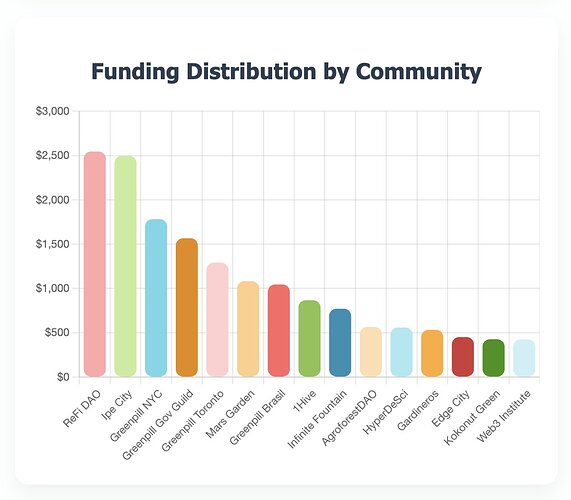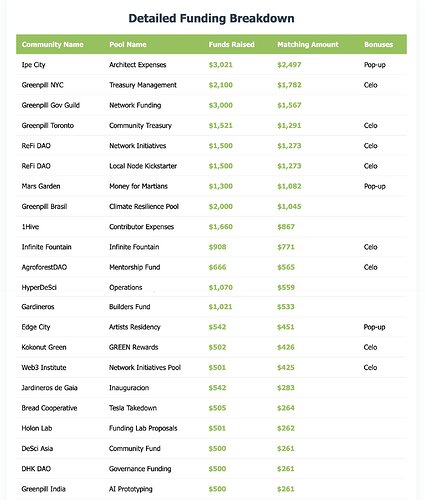Gitcoin Grants Garden  GG23 Retrospective
GG23 Retrospective
Overview
The Gitcoin Grants Garden GG23 Community Round marked a significant milestone in our mission to advance public goods funding through innovative governance mechanisms. As the second iteration of our community round, we succeeded in fully transitioning from Quadratic Funding (QF) to Conviction Voting, leveraging the Gardens v2 platform to create a more sustainable and community-driven funding ecosystem.
With $30k in matching funds raised from Gitcoin, 1Hive, and Celo Public Goods, our round supported 21 communities across diverse sectors including Ethereum open source software, pop-up cities, node / chapter-based orgs, DeSci, IRL groups, climate initiatives, political activism, and beyond. The round demonstrated the power of modular conviction voting for creating continuous, high context, bottom-up governance and protecting against common forms of governance abuse.
Key Results
Financial Impact:
- $60,659 total funding raised:
- $25,900 from eligible communities
- $20,990 from Gitcoin
- $10,744 from 1Hive
- $3,000 from Celo Public Goods
Matching Funding Track:
- $18,000 matching funds distributed on $25,900 raised from communities, added to funding pools on Gardens.
- 21 communities funded
- $818 average matching amount
- $2,497 highest matching amount
- 104 unique participants
- 1.7x average matching multiplier
Allo Builders Funding Track:
- $12,700 distributed to capital allocation builds
- 17 funding proposals created
- 6 projects funded
- $2,117 average funding per project milestone
- 27 governance participants
- $1k in funds still to be allocated, and working on additional funding
See our Round Finance Spreadsheet and Dune Dashboard for the full data.
Round Mechanism & Innovation
Our round took advantage of the unique modular governance structure of Gardens, running several governance pools each with their own eligibility criteria, voters, voting weight systems, arbitration settings, and conviction parameters.
To participate in any of the pools, members joined the Gitcoin Grants Garden, signing the Community Covenant and staking 1 $GTC to join. Participants had the option to increase their GTC stake, giving them more governance weight in some pools.
Governance pools fell into 3 separate tracks of round coordination on public goods ecosystem growth:
1. Matching funding for communities
To be eligible for matching funds, projects created a community on Gardens (if they didn’t have one already) and funded a funding pool targeted at a need within their community. The Council Safe approved funding pools after reviewing them for proper setup of the community and funding pool on Gardens, a clear benefit of conviction voting for the distribution of funds, and the use of a highly liquid token for funding.
Communities were eligible for bonus matching if their Gardens community was based on Celo network, and if they were classified as a pop-up city/village - sponsored by Celo Public Goods and 1Hive.
2. Allo.Capital Builder’s Fund
A Gardens funding pool built for milestone-based support for capital allocation / capital formation / decision mechanism builders. To be eligible, proposals listed deliverables and an expected timeline to complete, and requested the amount of money needed to execute. Proposals that requested more funding needed more conviction from voters to pass, algorithmically set by the Gardens platform.
The pool is still active and governed by Allo Patron NFT holders, and is being used to develop a cohesive and supportive builder community in the Allo.Capital ecosystem.
Builders showcased their projects and proposal in this Allo Builders show and tell: https://x.com/owocki/status/1923416344390951056
3. Signaling Pools
The final track in the round included several non-financial governance pools designed to promote Ethereum ecosystem alignment. These signaling pools included:
- Pain Points of Ethereum - identifying issues holding back mass adoption of Ethereum
- Regen Communities / Regen All Stars - identifying people and projects in the ecosystem strongly aligned with the regen ethos.
- Council Safe Election - round admin were democratically elected through this governance pool.
When possible the round aimed to reduce complexity for participants as much as possible, but this proved to be our greatest challenge as an experimental round built on newer infrastructure on a relatively short timeline. To mitigate issues related to the complexity we set up robust support for participants, including:
- Real-time Telegram support with dedicated topic channels
- Educational workshops and onboarding sessions
- Comprehensive documentation and video tutorials
These proved to be indispensible for many of the round’s participants, who noted process friction and UI/UX issues.
Lessons Learned
To review the impact of our round we used a combination of onchain data and surveys of round participants and Council Safe members. Here are the key learnings from our analysis:
Technical Challenges
- Due to heavy traffic, the Gardens platform experienced subgraph latency with 1-5 minute delays in onchain actions showing in the UI, requiring attention from Gardens Core devs.
- UI/UX friction, especially for users with no previous web3 experience.
- Wallet connectivity and UX challenges, especially for MetaMask and WalletConnect users.
Process Challenges
- Community onboarding required significant hand-holding for Gardens newcomers
- Eligibility criteria for matching didn’t clarify which assets could be used as funding tokens in pools. Some projects registered funding pools with assets with very little liquidity, prompting the Council Safe to meet and reach consensus that only major tokens with high liquidity could matched. Some projects then needed to recreate their funding pools to be eligible.
- Late registration pressure created support bandwidth constraints in final hours.
Highlights from Community Feedback
Data collected in our post-round survey:
- Overall experience: 7.1/10 average satisfaction
- Application process ease: 6.8/10 average rating
- Gardens app interface: 6.3/10 average intuition score
- Ecosystem growth achievement: 7.0/10 average rating
Top Feature Requests:
- Improved proposal submission workflow
- Mobile app optimization
- Enhanced analytics dashboard
- Integration with other DAO tools
- Multilingual support
Next Steps for the Gitcoin Grants Garden
Building on the success of GG23, we’re committed to advancing public goods funding through several key initiatives:
Product Development
- Incorporate UI/UX feedback into the Gardens Core product roadmap, prioritizing the biggest pain points and feature requests from users.
- Target integrations that address community pain points outside the scope of Gardens roadmap, like governance token issuance, capital formation, and other novel capital allocation and decision sourcing mechanisms.
- Improve analytics dashboards with real-time metrics and insights.
Performance-Based Matching
- Set up tracking on project funding pool metrics in Karma GAP, identifying successful funding pool activity for future matching rounds.
- Move beyond funding-only matching to include performance-based criteria by developing impact measurement frameworks that reflect effective use of the Gardens platform
- Where onchain metrics fall short, help communities source qualitative feedback from members on the effectiveness of their programs and sustainable ways to raise more capital.
Ecosystem Partnerships
- Source more partnerships with platforms and protocols, potentially through track-based matching rounds in GG24.
- Increase available matching funds through a diversified partnership network.
- Cross-pollinate learnings with other conviction voting experiments, decision mechanisms, and grants programs.
Continuous Governance
- Engage Gitcoin Grants Gardens participants between rounds through off-season governance initiatives
- Leverage conviction voting strengths for ongoing community coordination
- Maintain active governance pools for ecosystem signaling and coordination
Tokenomics Innovation
- Advance work on the Gardens governance token and 2-token model for public goods funding
- Build structures to help communities implement these models, and look to incorporate into the GG24 funding program process.
- Explore more designs for a sustainable value accrual token for long-term organizational health.
Conclusion
The Gitcoin Grants Garden GG23 round successfully demonstrated that conviction voting can serve as a powerful alternative to traditional quadratic funding, enabling more sustainable and community-driven public goods allocation. By combining the strengths of Gardens v2 with the expertise of the Gitcoin community, we created a governance experiment that balanced innovation with practical funding needs.
As we prepare for the next iteration, we’re committed to incorporating feedback, expanding partnerships, and advancing the infrastructure needed to scale conviction voting as a core mechanism for public goods funding.
The round proved that Gardens grow things ![]() - not just funding, but communities, governance innovations, and sustainable coordination mechanisms that can serve the broader Ethereum ecosystem for years to come.
- not just funding, but communities, governance innovations, and sustainable coordination mechanisms that can serve the broader Ethereum ecosystem for years to come.
- Round Operators: @paul2 (Lead), @Oba-One, @cauetomaz
- Council Safe: @MattyCompost, @wasabi, @luizfernando
- Round Advisor: @Sov
For detailed metrics and ongoing updates, visit our Karma GAP community page.
Links
- Gitcoin Grants Garden - App Link: https://app.gardens.fund/gardens/10/0x1eba7a6a72c894026cd654ac5cdcf83a46445b08/0xd3345828914b740fddd1b8ae4f4d2ce03d1e0960
- Round Finances Spreadsheet: Gitcoin Grants Garden - GG23 Round Finances - Google Sheets
- Dune Dashboard: https://dune.com/gardens_fund/gitcoin-grants-garden
- Notion with Round Info: The AI workspace that works for you. | Notion
- Community Telegram group: Telegram: Join Group Chat
- Community Round Application in Grant Ships: GrantShips<>Gitcoin
- Demo: How to Create Proposals on Gardens - https://www.youtube.com/watch?v=XqJi4TkwqSY
- Demo: How to Join a Garden and Vote on Proposals - https://www.youtube.com/watch?v=vI20ce3S_i8
- Allo Builders Show & Tell: https://www.youtube.com/watch?v=EqN2JmcxbcY
- Documentation: How to Grow Using Gardens: The AI workspace that works for you. | Notion

